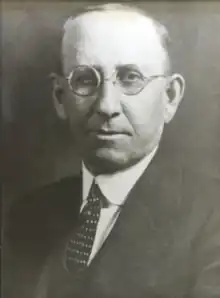James Yeakel
James Milton Yeakel was an American politician who served as mayor of Bethlehem, Pennsylvania for eight years between 1922 and 1930. Before entering politics Yeakel worked as a Coachbuilder.[1]
Mayor James M. Yeakel | |
|---|---|
 | |
| 2nd Mayor of Bethlehem, Pennsylvania | |
| In office 1922–1930 | |
| Preceded by | Archibald Johnston |
| Succeeded by | Robert Pfeifle |
| Chief Burgess of Bethlehem | |
| In office 1914–1918 | |
| Bethlehem Councilmen | |
| In office 1890–1901 | |
| Personal details | |
| Born | March 28, 1860 |
| Political party | Democratic |
| Occupation | Coachbuilder |
Biography
Early life
Yeakel was born on March 28, 1860 in Bethlehem to Peter and Marguerite Yeakel, both immigrants from Germany. He attended public school until he was thirteen when he would be privately tutored by Moravian professor Ambrose Rondthaler. He worked on his family farm until he was apprenticed to a wheelwright named Henry S. Sellers. Starting in 1890 he worked as a Coachbuilder with a partner at the Fatzinger & Yeakel company, until Mr. Fatzinger died and Yeakel took sole ownership of the company.[2]
Town council
Yeakel was elected to the Bethlehem council in 1890, having been elected to the office three times, and appointed to the office once, serving until 1901. He was one of the few Democrats on the otherwise strongly Republican council. On November 4, 1913, he was elected Chief Burgess of Bethlehem, with his term expiring in 1918.[2]
Mayoralty
Yeakel would be elected mayor in 1922. As mayor Yeakel focused his efforts on improving the city's infrastructure and services. Namely supplying clean water to city residents, ensuring sufficient fire protection and developing more land that had been previously unusable in the city's southside.[3] As mayor he also oversaw the construction of the Hill to Hill Bridge connecting the two halves of the city.[4][1] Additionally during his time as mayor the city's newspapers the Daily Times and the Globe merged to form the Bethlehem Globe-Times which is now known as The Express-Times.[1] However, Mayor Yeakel is most infamously for his inaction as Bethlehem became known as a resort town for New Yorkers to come and commit various vices that where illegal at the time due to Prohibition. Gambling dens, brothels, and Speakeasies where commonplace in the city's southside.[5] On November 12, 1927, officer Charles Fenton was shot and killed attempting to apprehend a robbery suspect from one of the south side's 35 brothels. His death sparked massive outcry for the city government to step in and restore law and order.[6] Mayor Yeakel seemed disinterested at best with the growing issue of crime and violence in the city's south side. This would result in his defeat in his re-election campaign in 1930 to Robert Pfeifle who ran on a tough on crime platform.[5]
References
- "Mayors of Bethlehem". www.bapl.org. City of Bethlehem. Retrieved 29 November 2022.
- JORDAN, JOHN W. ""Encyclopedia of Pennsylvania biography"". Wayback Machine. Hillman Library. Retrieved 13 May 2023.
- YEAKLE, JAMES M. "FIRST ANNUAL MESSAGE OF MAYOR JAMES M. YEAKLE AND STATEMENTS OF RECEIPTS AND EXPENDITURES OF THE CITY OF BETHLEHEM, PA. INCLUDING REPORTS OF SUPERINTENDENTS OF THE VARIOUS CITY DEPARTMENTS AND STATESMENTS OF THE FUNDING AND FLOATING INDEBTEDNESS SCHEDULE OF ASSETS AND ASSESSED VALUATION OF TAXABLE PROPERT" (PDF). bapl.org. City of Bethlehem. Retrieved 29 November 2022.
- "History's Headlines: Bethlehem's Hill-to-Hill Bridge". www.wfmz.com. Maranatha Broadcasting Company, Inc. Retrieved 29 November 2022.
- Radzievich, Nicole. "'Crime buster' mayor honored from Bethlehem's bawdy days". www.mcall.com. Tribune Publishing. Retrieved 19 November 2022.
- Nerl, Daryl. "Roaring '20s Cop Killing Remembered in Bethlehem". patch.com. Retrieved 19 November 2022.